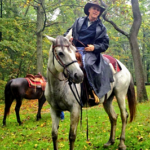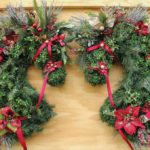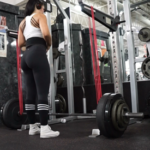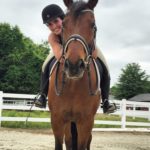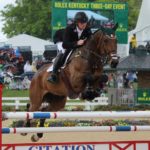
Carl Hester represented Great Britain in three Olympic Games and won 32 national championships. He trains horses to Grand Prix near Hartpury, Gloucestershire, and has run his own training yard since 1993. Polly Ellison, an equestrian journalist, has worked with a number of European trainers as well as with Hester. Here we’ve excerpted parts of the Introduction and Chapter Three from Real Life Dressage, with permission of Half Halt Press.
Introduction
It may surprise you to discover that all the horses introduced in this book are horses who have problems. None of them is perfect–because in real life dressage the perfect horse doesn’t exist.
The aim of my book is not to describe ideal training scenarios but to look at what we can do, to the best of our ability, with the horses we have. Difficult horses can become good horses and it is important not to give up until you are absolutely sure it’s not going to work. If there is a glimmer of hope, it is worth persevering. It might take longer to get there, but if you, the rider, have the patience it may well still be possible–and this is just as true at the higher levels as it is at the lower ones.
All the horses featured in this book have Grand Prix as a goal. In fact, I would not be working with them if I thought they were not going to make it. While it is possible that not all of them will reach such dizzy heights, there is a good chance that one or two will. The interesting thing about these horses is that they are a cross-section of different personalities and different types; some big movers, some not so big; some energetic, some lazy–but as I discuss how I train each one with Grand Prix as the ultimate goal, I hope to show you how different methods apply to different horses.
Intelligent Riding
Riding the Big Movers
It is important not to let a big-moving horse always move big. This is one problem I had with Peanuts which I have never had with Pro Set, for example. Peanuts has always wanted to move like a Grand Prix horse, whereas Pro is one that I will teach to move that way. As a result I mostly keep Peanuts in a working trot so he saves himself.
Big movers can sometimes have no real engagement as young horses, so they have to learn to move less extravagantly to be in real balance. In the same way, the small movers have to learn to let go and move bigger.
As a rider and trainer I find these horses particularly interesting simply because they are so different. The secret of their success is that despite their different shapes, sizes and temperaments when they are trained to take into account their own individual needs, as with any other horse, it is possible to get the best out of them.
Fizzy Horses
“Hot” horses need patient handling, and a routine is all-important. An ideal training session for a very hot horse would be to warm him up, do some work on his difficult, problem areas, and then make a mental note to finish off on the things you know he can do well and enjoys.
Fizzy horses need to be submissive enough to allow themselves to be ridden, which can only come about as a result of a good, trusting relationship with their rider. They cannot perform if nervous or quashed by the rider.
Riders need patience and should be prepared to drop down a level in competition in order to obtain the submission and confidence they require from their horse. If necessary, go back to basics sometimes and take the pressure off the horse by returning to simple stretching exercises in a snaffle bridle or by just hacking for a week.
Be prepared to go to a few shows before you start to compete to get your horse used to being out and about. At international shows it is possible to arrive a few days before the event, and this is always useful.
Give your Horse a Break
Horses don’t have to be schooled every day–they need holidays too. Don’t worry that your horse will forget everything it has been taught. It won’t. When a horse is relaxed it is amazing just how much it will pick up. Hacking and regular turn-out relieve stress. Variety is the key, so get your horse out doing different things.
Visit www.EquineNetworkStore.com or call 1-800-952-5813 to order Real Life Dressage.



